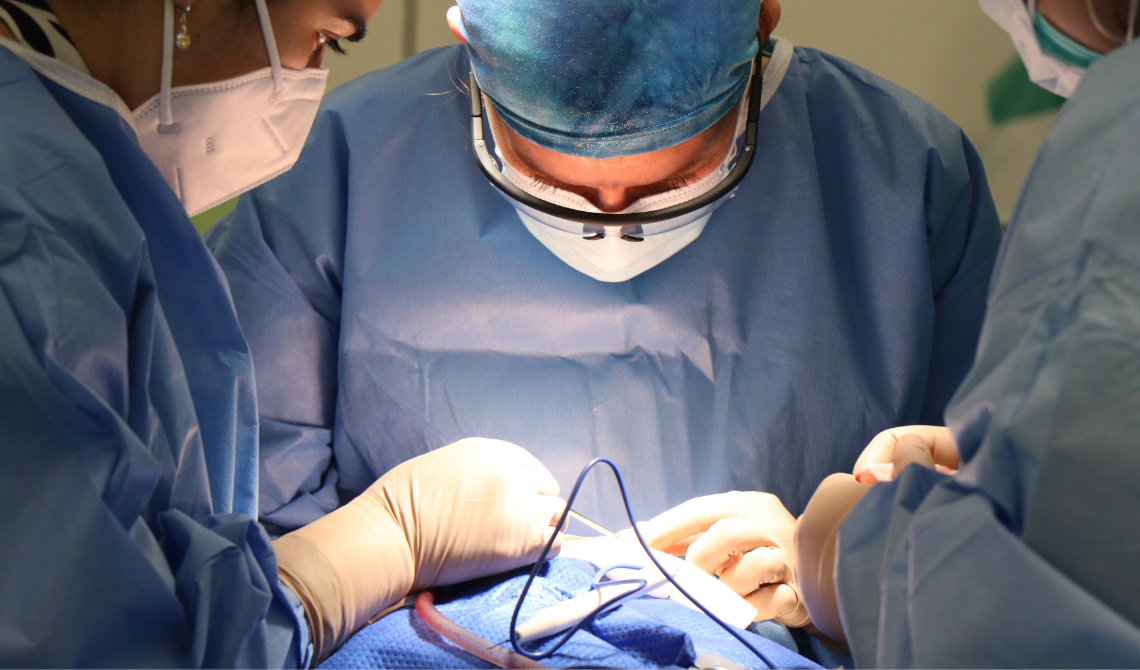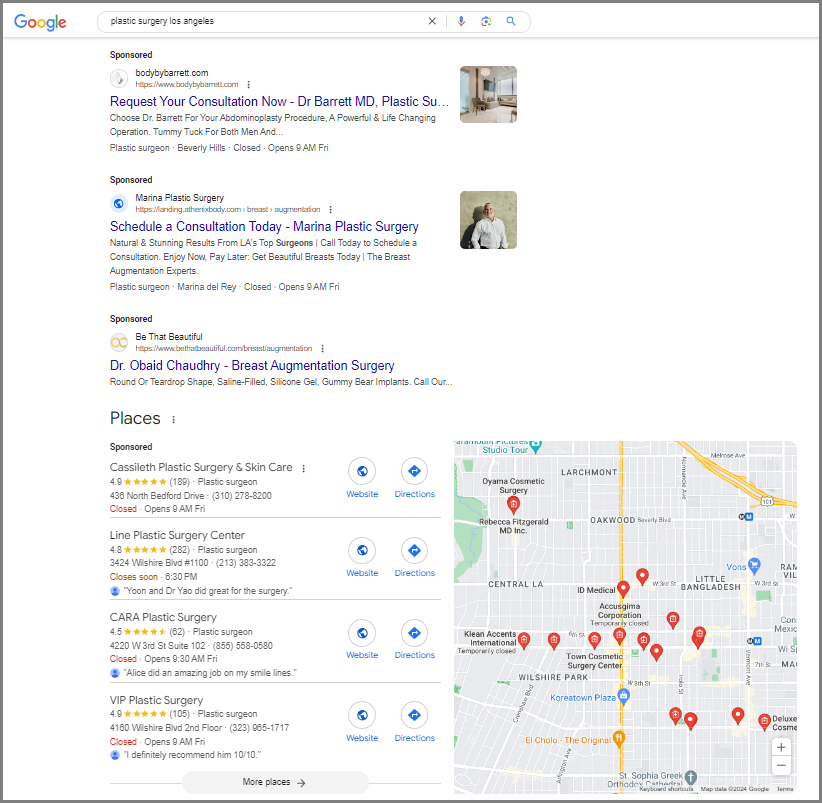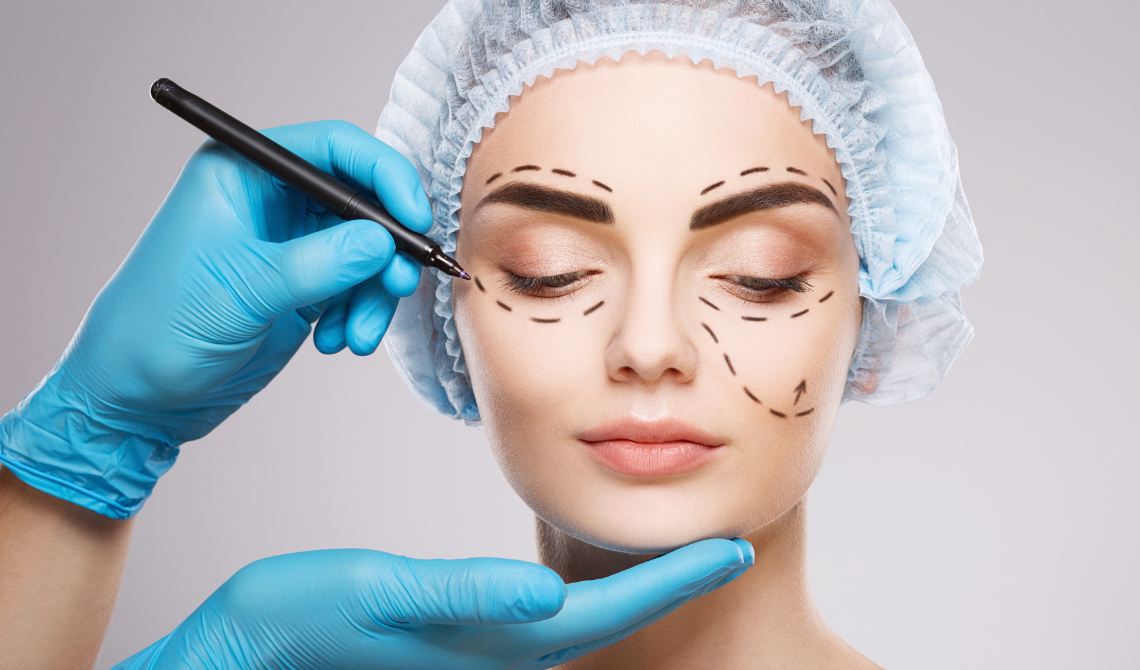Watching your fellow plastic surgeons enjoy an established and more robust online presence as they try to accommodate patients, consultations, and procedures left and right is frustrating when you know you have far superior skills and a better offer.
But it’s even more upsetting when you’ve already invested in digital marketing avenues like pay-per-click (PPC) advertising and they haven’t panned out.
While you don’t want to give up on online advertising, especially because you know many of your future patients start their search online, you’re losing hope.
After all, none of the so-called “experts” you’ve worked with have ever delivered your desired results, and you don’t have the time to spare to develop the expertise in the field.
Fortunately, you don’t have to abandon your hopes of dominating the online realm and driving internet users to your plastic surgery clinic and industry-leading services.
That’s because PPC marketing works. The problem is that you haven’t yet found the right firm to partner with.
Because here’s the truth: like how plastic surgeons significantly differ in skillsets and experience, there’s a considerable disparity between digital marketing agencies in approaching search.
We, for example, focus on researching, analyzing, and auditing before asking any of our clients to make a decision about their marketing budgets. Why? Because we want to understand you.
We want to know what your business’ unique needs and goals are. Because when we do, our inside track on the maths of PPC can tell us how to tailor your campaigns to achieve your objectives and maximize your dollars.
Call (+1) 310 879 8003 or email [email protected] to book a no-pitch consultation with our PPC advertising experts and find out how we can help your plastic surgery practice get a leg up over its competition.
Why PPC Should Be on Every Plastic Surgeon’s Radar
As of April 2024, around 9,540 plastic surgeons are employed in the U.S. (United States), and roughly 525 of whom operate in L.A. (Los Angeles).
If this statistic tells us one thing, competition for potential patients in the plastic surgery industry is fierce. So, what do you do? How do you ensure your target audience chooses your practice over your peers’?
Having exceptional skills and competitive offerings are ways to stand out. However, they might not be enough in an age where approximately 97% of people rely on the web to find businesses and services.
Here’s where a digital marketing strategy like pay-per-click (PPC) advertising comes in. In a nutshell, PPC lets you buy your way to the top rankings of Google Search and Google advertising partners.
Why does that matter for your plastic surgery practice? A significant presence on search engine results pages (SERPs) puts more eyes on your clinic, giving you more chances to reach prospective clients.
Understanding the Basics of PPC Ads for Plastic Surgery
Although PPC marketing is straightforward, at least regarding its core principle, it can be complex— a notion we’re confident you can agree with if you’ve ever tried running PPC ads independently.
Unfortunately, many digital marketing agencies fail to correctly demystify the topic, with these “pros” relying on technical jargon to make themselves sound like experts.
But not us. We believe in keeping our clients in the loop with everything we’re doing and why we’re doing it— to give them the tools to take control of their ad campaigns anytime.
So, with that out of the way, here’s PPC marketing in simple English:
What Is PPC?
PPC, short for “pay-per-click,” is a paid advertising technique wherein you display your marketing materials on various publisher platforms, such as search engines, social media sites, and other websites.
You pay whenever someone clicks on those ads— it’s that simple.
Think of PPC advertising as akin to renting a billboard. But instead of paying a fixed fee regardless of how many people notice it, you only pay whenever someone stops and takes a closer look at your message.
If managed by a firm like us, one that speaks the same language as these publishers— mathematics— PPC ads become cost-effective avenues to improving your online presence and reaching your desired audience.
What Is Search Intent?
PPC advertising’s on-the-nose payment model makes it an extremely economical digital marketing strategy. Unfortunately, that’s also one of its primary downsides.
You pay for the traffic your ads generate. But this might include the ad views and interactions from internet users who might not be your intended audience.
Fortunately, platforms like Google Ads (previously called Google AdWords and Google AdWords Express) provide targeting options, allowing you to choose who can see and, by extension, click on your adverts.
Enter search intent. In a nutshell, it refers to the reason for someone’s search. Understanding this purpose is crucial to maximizing your marketing dollars.
But don’t worry. Our penchant for digging into the numbers allows us to consistently identify the right audience and craft adverts that compel them to take action, such as booking a consultation.
How Does PPC for Plastic Surgeons Work?
A PPC strategy involves choosing “keywords.” For a plastic surgeon, these keywords refer to words or phrases potential patients use to search for information about this healthcare field.
Why is keyword selection critical to plastic surgery PPC? Your target search terms trigger the appearance of your ads. Unfortunately, it’s here where things get even more complex.
Let us explain.
Bidding on Keywords
Say you want your adverts to appear for searches related to rhinoplasty. In that case, you select keywords like “rhinoplasty near me” or “rhinoplasty procedures in Los Angeles.”
But before your ads can target internet users using these search terms, you must win the ad auction. This stage involves bidding against other advertisers targeting your chosen keywords.
However, unlike a typical auction with only one winner, the ad auction provides 7 to 11 slots. If you win any of these slots, your marketing materials will appear on Google’s first page.
Yes, the more people vying for a keyword, the more expensive bidding becomes. Fortunately, although influential, your bid amount is only one factor that impacts your chances of winning the auction.
Publishers like Google consider your quality score to determine your ad rank. Your quality score is a metric that represents the following:
- Your ad’s relevance to the target search term
- The usefulness of your landing page (the web page internet users are redirected to after clicking on your ad)
- Your ad’s media format (i.e., text, video, audio)
- Your advert’s expected CTR (click-through rate or the click ratio of your advertisements)
To help you win the ad auction and maximize your marketing budget, we find the right balance between adjusting your bids and raising your ad’s quality scores. The higher the latter, the less you spend on bids.
Types of Plastic Surgery PPC Ads
A successful PPC campaign can effectively advertise your plastic surgery practice and attract qualified leads— people actively searching for what you offer.
But how does one ensure the success of an advertising campaign? Apart from understanding your target audience’s search intent and optimizing your bids, you should also pick the appropriate ad type.
That’s right. The type of PPC ads you use can significantly impact converting web visitors into new patients, consultations, and procedures for your plastic surgery clinic.
Think about it. Would you click on an audio-based promo when you have conductive hearing loss due to aural atresia? Probably not. And neither will internet users who have the same condition.
So, what are the ad types you have at your disposal? Here they are:
Traditional Paid Search Ads
When you hear the term “PPC ads,” search ads will likely come to mind. And who can blame you? After all, search ads are the adverts that appear when you do a Google search.
Paid search campaign ads also appear on Google Search partner websites, such as Ask.com, Amazon.com, and NYtimes.com, allowing you to promote your clinic and services through several channels.
Smart Campaigns
Managing a PPC campaign can be challenging if you don’t have the know-how. Google’s Smart campaigns solve this problem by automatically optimizing your adverts for you.
Sounds good, right? However, we generally don’t recommend smart campaigns for our clients. Why? Here are some reasons:
- Takes away your control: Smart campaigns don’t let you choose your campaign type, how they’re optimized, and where your PPC ads will show up.
- Limits your targeting ability: The auto-optimization features won’t let you define a target audience based on your criteria.
- Outcomes take longer: Unlike traditional Google Ads campaigns, smart campaigns can take several months to show results as the tech giant needs more time to gather and analyze data from the ongoing campaign.
Performance Max
If you don’t have the time to master PPC advertising, consider Google’s Performance Max campaigns. This PPC tool leverages A.I. (artificial intelligence) technology to enhance your ads.
So, how does this type of PPC differ from Google Smart campaigns? Google Performance Max campaigns make your ads more compelling, increasing average conversions by 18% at a similar cost per action to a traditional Google Ads campaign.
YouTube Ads
Sometimes, a short message is all it takes to convince someone to take your desired action. Fortunately, no one’s saying that that message must be in text format.
Enter YouTube Ads, which come in the following styles:
- In-stream: Video ads that appear before, during, or after a video, which can be skipped after five seconds.
- Discovery: These video adverts appear as video results.
- Non-skippable: As its name implies, these adverts cannot be skipped. Traditional non-skippable ads generally last up to 15 seconds. However, “bumper” ads only last up to six.
Note that YouTube ad campaigns also let you display your advertisements on games, mobile apps, embedded website videos, or anywhere your target audience discovers content.
Display Ads and the Google Display Network
The Google Display Network comprises over two million websites, apps, and videos, including YouTube, Gmail, news pages, and blogs. Why did we mention this fact? Simple: this network reaches 90% of internet users.
Simply put, tapping into the Google Display Network through display ads, which can be in image, flash, and audio forms, allows you to promote your plastic surgery practice to an unimaginable number of people.
Paid Social
PPC advertising is often synonymous with running paid ads on Google. However, the search engine giant isn’t the only publisher that utilizes a pay-per-click model.
Social media marketing (SMM) lets you display paid ads on Facebook, Instagram, and X (previously called Twitter). The question is, “Why should you choose paid social media ads over traditional search ads?”
As of April 2024, there are over five billion registered users across various social media platforms— billions of chances to build brand awareness and drive traffic toward your plastic surgery website.
Remarketing Ads
First things first, retargeting and remarketing are two distinct digital marketing strategies. The former involves displaying ads to individuals who have previously interacted with your brand, whether on your website or social media.
On the other hand, remarketing is about reengaging your existing customers through various channels, such as email and paid advertisements.
Whichever tactic you choose, the goal is to urge them to convert, such as booking a consultation or procedure.
Local Services Ads
Do you want your ads to target a local demographic specifically? If yes, consider Google Local Services Ads (LSA), which are adverts that do just that— target users searching for your services in your chosen area.
The benefits of using LSA to market your plastic surgery practice include the following:
- Your ads show at the top of search engine results pages (SERPs)
- Potential patients can call, message, or schedule a booking directly through your adverts
- LSA comes with “Google Guaranteed” or “Google Screened” badges, raising your clinic’s credibility
Email Ads
When was the last time you checked your physical mailbox? Chances are, it’s probably been a while. After all, receiving and sending messages via email is convenient.
Your target audience likely feels the same way. With email advertising, such as Gmail Sponsored Promotions (GSP), you can reconnect with past clients and keep them engaged with your practice.
The Top Advantages of Utilizing PPC for Plastic Surgery Marketing
Around 65% of SMEs (small-to-medium-sized enterprises) have a PPC campaign. It’s easy to say that businesses choose PPC advertising over other digital marketing strategies because it works.
Although that’s true, there are several reasons why PPC stands out as a not-to-miss tool for plastic surgery marketing. So, let’s get familiar with these arguments, shall we?
Precise Audience Targeting
The more people click on your ads, the faster your ad dollars run out. When it does, unfortunately, the traffic, leads, and conversions you were getting from your PPC campaign stop.
Fortunately, platforms like Google Ads and Facebook Ads provide targeting options, allowing you to set an audience for whom to display your ads based on criteria such as the following:
- Keywords
- Location
- Demographics
- Interests
- Device types
And if you partner with a PPC management service provider like us, one that focuses on acquiring the leads that matter to you, you ensure your ad spend only goes toward getting these leads— not anyone else.
Attract Engaged Customers
Not everyone who clicks on your ads or browses your plastic surgery website will inquire, schedule a booking, or otherwise convert. But it doesn’t mean these users won’t do so in the future.
Enter remarketing. Publishers like Google provide remarketing capabilities, letting you reengage those who have previously shown interest in your offerings.
Coupling that with our dedication to ensuring your PPC campaign ads give your target audience what they want, you encourage casual browsers to perform your desired actions and become loyal patients.
Boost Your Online Reputation
Testimonials and reviews can shape perceptions about your plastic surgery practice. But do you know what will help you achieve this task better? A prominent position on the first page of SERPs.
People trust search engines like Google and Microsoft Bing to provide the most relevant results to their queries. If your search ads are always on the first page, people can’t help but believe you’re #1.
Here’s where our experience comes into play. Having launched over 2,000 client campaigns, we know what it takes to win the few highly coveted first-page ad slots.
Reduce Advertising Costs and Maximize ROI
The most significant benefit of leveraging PPC in your plastic surgery marketing strategy is that you only pay for the traffic your ads generate, letting you make adjustments to match your budget.
If you partner with us, you can use this online advertising tool even better to maximize your return on investment (ROI). After all, we’ve done it consistently. Don’t believe us? Ask our clients.
On average, we’ve:
- Reduced wasted ad spend and campaign costs by over 30%
- Lowered our clients’ cost per sale by 23%
- Improved leads and sales numbers by 83% (400% for some clients)
What Plastic Surgery PPC Advertising Isn’t
As much as we want to proclaim PPC advertising as a perfect digital marketing strategy, we know it isn’t. Like other tactics, it has downsides that might be detrimental to your plastic surgery practice.
For one, PPC doesn’t work for all budgets. The cost-per-click (CPC) for highly competitive keywords can be steep, making some inefficient to bid on if your ad dollars are significantly limited.
Another limitation: advertising platforms like Google Ads constantly change, which can make previously lead-generating campaigns ineffective after an update. In other words, PPC isn’t a run-it-and-leave-it tactic.
Yes, PPC marketing is many things. What it isn’t is a one-size-fits-all solution. Just as no two plastic surgeons are the same, each campaign must be tailored to the practice’s objectives, competition, and target audience.
Fortunately, you can trust us to tell you if a PPC campaign isn’t the best use of your hard-earned dollars. After all, we only work with clients for whom we can deliver unbeatable returns on investment.
Are you ready for a professional relationship rooted in trust and candor? Schedule a free audit of your ad campaigns by calling (+1) 310 879 8003 or emailing [email protected].
How Much Does PPC for Plastic Surgeons Cost?
Until we intimately understand your plastic surgery practice, we can’t put an exact dollar value on your eventual PPC campaign expenses as various factors, like your target keywords and audience, impact the cost.
That said, you can be confident that once we’re done with our research, analysis, and audit, you’ll receive an all-inclusive pricing model that lets you know precisely how much you’ll pay us for managing your ads.
You’ll also pay publishers like Google directly for the clicks. Unlike other online marketing companies, we’ll manage your campaigns through your advertising account, giving you a clear view of your costs.
And the best part? We don’t charge performance bonuses. In short, you only pay a fixed fee for our management services even if your adverts become better at maximizing your marketing budget.
Common Issues Inherent to Plastic Surgery PPC
Clicks that can quickly become expensive, easily duplicated campaigns, and constantly changing platforms are all landmines you should be wary of if you want to use PPC marketing to promote your clinic.
Despite these inherent disadvantages, PPC ads are still one of the best tools to give your practice’s website instant and guaranteed traffic.
Whether the benefits outweigh the cons depends on whom you entrust your advertising dollars to. So, to make a case for ourselves, here’s how we’ll minimize PPC’s shortcomings:
Creating Successful PPC Campaigns for Plastic Surgeons
Marketing isn’t about tricking people into doing things they don’t want. Instead, it’s about finding what’s most important to your target audience and providing it.
Our PPC management services follow this principle, focusing on crafting marketing materials that resonate with and address your potential patients’ needs and desires.
Define Campaign Objectives and Target Audience
The foundation of a campaign that delivers patient leads, consults, and procedures to your plastic surgery practice lies in defining objectives and identifying the right audience.
If you’ve tried running a PPC campaign before, you know that to be true. That’s why before we ask you to invest a dime, we do our homework first— understand your goals and establish what a “quality lead” is for you.
Write Persuasive Copy and Use All the Space Available
Most internet users experience a never-ending barrage of ads online. So, if you create ad copies solely to have ad copies, you’re making it less desirable for your target audience to click your adverts.
Fortunately, we have a seasoned team of copywriters specializing in marketing to craft high-quality ad copies that provide value and encourage engagement.
Whether giving information about a procedure, highlighting your plastic surgery practice’s unique selling points, or encouraging users through your call-to-action (CTA), our team maximizes all the available space.
For reference, Google text ads are composed of the following elements and their respective available space wherein you can make your appeal:
- Two headlines, each with a 30-character limit
- Two display paths that have up to 15 characters each
- A description section that allows for up to 80 characters
Perform Keyword Research Using Google Keyword Planner

If you want maximum visibility, you must identify and bid on the search terms your ideal patients use when looking for plastic surgery-related information.
After all, these keywords trigger your ads to appear for users who type them into a search bar. Unfortunately, picking the keywords that offer the best returns is always easier said than done.
But not for us. After all, we have a sophisticated keyword selection process that utilizes various industry-standard tools, such as Semrush, Ahrefs, and, of course, Google’s very own Keyword Planner.
Consider Keyword Match Types
Picking the optimal search terms to target is vital for PPC success. But to truly maximize your PPC budget, you must further define when your ads will show. Enter keyword match types.
In a nutshell, keyword match types are additional campaign settings that control how closely a user’s search query must match your target keywords for your adverts to be eligible to appear.
To explain, let’s look at the four primary match types, which are:
- Broad match: If you use this setting, your ads will appear even if the user query is misspelled or a synonym— as long as the search is relevant to your target keyword
For instance, let’s assume your target search term is “liposuction.” In this case, queries like “fat removal” will still make your ads appear.
- Phrase match: This match type ensures that your adverts appear for searches that contain your primary keyword. For instance, a query for “rhinoplasty services in Los Angeles” will trigger ads targeting “rhinoplasty services.”
- Exact match: This keyword match type is how it sounds— your marketing materials will only appear for search queries that are the same as your target search terms.
- Negative match: Under this setting, queries containing predefined negative keywords won’t trigger your ad’s appearance.
To explain, let’s assume your target keyword is “plastic surgery practice.” Say your negative keyword is “cosmetic.” If a user enters the phrase “cosmetic surgery practice,” your ads won’t show.
To maximize our lead generation efforts, we use the phrase match setting. However, depending on your unique situation, we can utilize other keyword match types. After all, we don’t provide off-the-shelf campaigns.
Use Every Ad Extension You Possibly Can
Ad extensions (now called assets) can add more character to your advertisements. How, you ask? Because they let you expand your ads to provide more information.
For this reason, we use as many ad extensions as possible. Some of the assets we utilize to make your PPC ads more compelling and increase their CTRs include the following:
- Call: An asset that incorporates your clinic’s phone number into your ads and allows users to call you directly
- Prices: A Google Ads extension that displays your services and their pricing on your adverts
- Structured snippets: An asset that lets searchers select the most valuable information about your practice via predefined headers
Adhere to PPC Advertising Guidelines and Legal Requirements
Our business is built on lasting relationships— partnerships earned with results. But how do we ensure your campaigns continue to deliver your desired outcomes?
For one, we don’t take shortcuts that might jeopardize your ad approval. Instead, we take the time to guarantee that your PPC campaigns follow platform policies.
For Google Ads, for example, we exclude specific search terms, such as those related to unapproved substances. For Facebook Ads, we limit your plastic surgery marketing campaign to users who are 18 or older.
For more information on how we ensure your PPC campaigns adhere to advertising guidelines and meet legal requirements, call (+1) 310 879 8003 or email [email protected].
Build Your Campaigns and Ad Groups Around Keywords
Are you a plastic surgeon seasoned in reconstructive surgery or cosmetic ones? Regardless of your specialization, your ads must communicate that forte. Here’s where ad groups come in.
Simply put, an ad group contains one or multiple adverts with similar targets. It helps give your ads a coherent theme. Hence, we create distinctive ad groups, such as one for your services or unique propositions.
For instance, an ad group focusing on reconstructive surgery procedures might include keywords such as palate repair, panniculectomy, and septoplasty.
On the other hand, an ad group for aesthetic surgery procedures might involve search terms like facelift, liposuction, and rhinoplasty.
Limit Your Ad Schedule to Times When It Performs Best
When in the day is your target audience likelier to see your advertisements? Determining that timeframe is critical in ensuring your ads get maximum exposure and increase the chances of engagement.
Fortunately, our PPC management services go beyond targeting people based on the usual options like location and device. We also tweak campaigns to leverage peak times and even seasonal fluctuations.
Maximize Ad Score When Creating Responsive Search Ads
To determine whether you’ll win one of the 7 to 11 slots and how high the ranking is, Google uses the following formula:
| Maximum Bid * Quality Score = Ad Rank |
If you want your ads to appear more often and more prominently on the first page of Google, you must get a high ad rank. How do we accomplish this task, you ask?
We focus on maximizing your ad’s quality score. After all, doing so puts less strain on optimizing your bids since a higher quality score makes these bids cheaper.
Target Mobile Primarily
Are you aware that approximately 63% of Google searches in the U.S. are done through mobile? Fortunately, platforms like Google Ads and Facebook Ads let you directly advertise to these mobile-oriented users.
As your PPC campaign partner, we aim to ensure your promotional materials are mobile-optimized and effectively convey your plastic surgery practice’s unique selling points.
Adjust Bids by Location Through Geotargeting
According to a 2022 report from the American Society of Plastic Surgeons (ASPS), 109,941 breast augmentation procedures were conducted in Region 5, including California (C.A.), in 2022.
Interestingly, only 33,153 were done in Region 1 states, such as New York (N.Y.) and Massachusetts (M.A.). These numbers tell us that targeting specific locations might yield better PPC results.
That’s why we utilize geotargeting. It allows us to pinpoint specific geographic regions where most converters are and where it’s more likely for you to reach potential patients.
Monitor Key Ad Metrics
Although more patients walking through your plastic surgery clinic’s doors could indicate that your marketing efforts are working, there is a better way to tell. And that’s by tracking your campaign metrics.
Some of the essential figures we measure to determine whether your PPC campaign is panning out or needs further optimization include the following:
- Clicks: The number of people who clicked your advertisement
- Impressions: The number of internet users who saw your ads or your advert’s exposure level
- Click-through rate (CTR): The rate at which people click your adverts after seeing them, which signifies the ad’s effectiveness (clicks divided by impressions)
- Average cost-per-click (CPC): The average amount you paid divided by the total number of clicks
- Cost: Your total ad spend
- Conversions: The number of users who converted based on your campaign’s enabled conversion actions
- Cost-per-conversion: The average amount you spent divided by the people who converted
- Conversion rate: The rate at which internet users convert compared to those who visited your website through your ads
Tracking qualified lead metrics can also be a way to gauge a PPC campaign. After all, what are clicks worth when they’re not leading to more consultations and procedure bookings for your plastic surgery practice?
So, instead of giving you a report highlighting the showiest numbers, we focus on aligning the update with your desired figures. Doing so allows us to monitor and tweak them when necessary to keep your lead quality high.
How Landing Pages Help Drive Conversions
What happens when a user clicks on your ads? If the PPC campaign is optimized correctly, it should send users to a dedicated landing page that aligns with their intent.
What is a landing page, you ask? It’s a web page users “land” on or get redirected to after clicking your advertisements. The question is, “Why should you have a landing page that offers the same details as the ad?”
That’s because it provides a seamless user experience, which helps encourage people to take action. Think about it. Who would you consult:
- A plastic surgeon advertising their services and directing you to their clinic’s offerings to help you find what you need?
- A plastic surgeon promoting their expertise and specializations who then forced you to scour their entire plastic surgery website?
The odds are high that you’d pick the first surgeon for your plastic surgery needs because they made it straightforward for you to do so. Chances are, your prospective patients would choose the same.
Have a Clear Call to Action
Creating landing pages that address the user’s intent can help drive conversions. But why slow-walk your target audience into an epiphany when you can tell them?
Fortunately, we have experienced marketing experts who excel at writing CTAs that don’t force people to go against their wishes but instead deliver their hearts’ desires.
Split Test Landing Pages
An effective landing page will be invaluable for your plastic surgery marketing strategy. But how do you know if your landing pages are precisely that— effective?
Some digital marketing agencies will look at the results. While we also track PPC campaign metrics to help us make informed decisions, we have a better way to test landing pages: split or a/b testing.
This testing process lets us compare multiple landing page versions, giving us a glimpse into which elements, such as CTAs and headlines, contribute to more potential patients for your plastic surgery practice.
Don’t Neglect SEO
One of the most prominent challenges people face with PPC advertising is sustainability. PPC campaigns require constant funding to get results. Otherwise, the results stop.
But what if we tell you that there’s a digital marketing strategy that can give you a consistent stream of patient leads, consultations, and procedure bookings even after your campaign ends?
Enter search engine optimization (SEO), an online advertising tactic that can help boost your organic search rankings and put your plastic surgery practice in potential patients’ radars.
The good news is that we also provide plastic surgery SEO services. If you want to leverage paid and organic channels into your marketing strategy, you can count on us to help.
Strategic Website Design
While success in digital marketing tactics like local SEO doesn’t require you to have a website, you shouldn’t discount the value of one. After all, a website can be a platform for potential patients to learn more about your plastic surgery services.
That’s why we also offer web development services, including creating website designs that help capture the attention of people who click on your promotional materials.
Using Google Ads Effectively
As mentioned, Google Ads offers an extensive reach that someone like you— someone looking to leverage PPC marketing to grow their practice— should consider.
However, like other PPC avenues, Google Ads can be challenging to manage. But not for us. Not to brag, but we know how to use Google Ads effectively. And that isn’t lip service.
It’s because we use the same advanced mathematics that Google engineers utilize, allowing us to consistently pick the moves that provide the most returns for your plastic surgery practice.
PPC Automation
Managing your PPC campaigns and adjusting them to adapt to developing trends in the plastic surgery industry is a continuous process. Fortunately, platforms like Google Ads have automation options.
There are three types of campaign changes you can automate, which are the following:
- Status change: This automation setting lets you pause or enable keywords, ad groups, and entire campaigns based on predefined conditions.
- Bid change: A setting that automatically raises or lowers your keyword bids.
- Budget change: A configuration that adjusts your PPC campaign budget depending on predefined times in the week.
Yes, we also utilize PPC automation to reduce the need to monitor campaigns and make manual tweaks. However, you can expect to see our human hands at almost every optimization.
After all, we understand that a truly successful digital marketing campaign, one that delivers the leads, consults, and procedures you’re after, has a human component.
PPC Reporting Tools
We pride ourselves on being transparent. We want you in the loop with everything we’re doing, why we’re doing it, and the results that come of it. For this reason, we don’t shirk out on reporting.
We use several industry-standard tools, including the following:
- Semrush
- Ahrefs
- Google Tag Manager
- Google Analytics
- Hubspot
Aside from these tracking and management instruments, we’ll also set up conversion tracking on your plastic surgery website, giving you insight into which campaigns, ads, and keywords are generating returns.
Spy on Your Competition
One of the drawbacks of PPC marketing is that your competitors can easily copy your campaign and ad settings, which can help them outbid you for high-value keywords.
However, the inverse is also true. That’s why one of our responsibilities is identifying and reverse engineering your plastic surgeon peers’ strategies, such as their target keywords.
After all, understanding what your competitors are doing to make their PPC campaigns effective in outperforming you in the plastic surgery industry and the digital realm is vital.
What Are Some Typical Results for a Plastic Surgery PPC Campaign?

We’ve been droning on and on about how PPC advertising can give your plastic surgery practice this and that. We’ve also discussed our approach to managing and optimizing ad campaigns effectively.
However, the question remains, “Will PPC marketing give your plastic surgery clinic the patient leads, consultations, and procedure bookings it needs?”
Unfortunately, we cannot give you a definitive answer— at least, not until we get to know you better and understand your practice’s unique situation, goals, budget, and competitive landscape.
However, we don’t want to keep you wondering, either. So, while we can’t promise you’ll get the same outcomes, here are the PPC campaign results for one of our plastic surgery clients: Dr. Richard Zoumalan.
- 1,473% better click-through rate
- 314.46% improvement in his conversion rate
- 55% reduction in his average cost-per-click
- 96% decrease in cost-per-lead numbers
“I was never the least bit skeptical to work with Digital Spotlight. From the get-go, [they] seemed more knowledgeable and found errors that my previous company had done that put me at a disadvantage.
[Digital Spotlight] took me to the first page of everything that I was trying to promote within a very short period of time. I have zero complaints and only positive experiences with [them].”
Richard A. Zoumalan, M.D. | Richard Zoumalan, M.D., Inc.
Want to find out what results we can deliver for your plastic surgery practice? Book a no-pitch consultation with us by calling (+1) 310 879 8003 or emailing [email protected].
Plastic Surgeon PPC Campaigns: DIY vs. Agency
You can launch, manage, and optimize your PPC campaigns without outside help. However, there’s a solid reason why you should consider partnering with a PPC agency— expertise.
If you’ve tried running a PPC ad campaign independently, you know how complex this digital marketing strategy is. But with professionals at your corner, you skip PPC advertising’s steep learning curve.
Hiring us, for instance, allows you to access a dataset gathered from our experience managing almost 2,000 campaigns over the past 15 years, giving you an inside track into what makes a PPC campaign effective.
So, does that mean hiring a digital marketing agency is the better choice? It’s hard to say. Hence, we perform research, analysis, and audits before asking our clients to sign up.
If we’re not confident that leveraging PPC marketing into your plastic surgery advertising strategy is the best use of your hard-earned money, we’ll tell you instead of trying to make the impossible possible.
Choosing the Right Plastic Surgery PPC Agency
Picking a digital marketing agency to share your PPC journey with is critical. After all, the odds are high that you’re reading this write-up to determine whether we’re better than your other agencies.
Fortunately, there’s a seven-question test to judge if we or any other online advertising company is the right team to help your plastic surgery practice establish a robust online presence and attract patients.
These seven questions are the following:
- Is the PPC firm focused on your goals?
- Does the digital marketing company have credentials to prove its claimed expertise?
- Is the agency providing actionable advice at no obligation?
- Does the advertising firm have case studies or testimonials corroborating the effectiveness of its strategies?
- Is the PPC agency confident in its ability to deliver your desired outcomes without locking you into long-term contracts?
- Does the digital marketing firm offer something unique, like a math-based approach to plastic surgery marketing?
- Do publications and financial experts seek the PPC company’s expertise?
If the answers to these questions were a resounding yes, you might have found the right plastic surgery PPC agency that can take your practice to new heights.
Plastic and Cosmetic Surgery PPC Services: What to Expect From an Agency
Yes, partnering with a digital marketing company for your plastic surgery advertising needs can yield significant benefits for your practice. However, PPC marketing firms aren’t created equal.
So, if what was discussed is yet to convince you to choose us over the countless other online advertising firms, allow us the opportunity to make a case for ourselves further.
Here’s what to expect if you entrust your marketing dollars to us:
In-Depth Audit
For many agencies, an audit kicks off the partnership. But not for us. After all, we’ll provide a comprehensive assessment of the current status of your PPC efforts before we ask you to sign up.
Why? Doing so allows us to understand your situation, which helps us identify areas of improvement in your ad campaigns and develop a tailored approach to acquire your desired results.
Strategy and Planning
As they say, “If you don’t know where you’re going, you’ll end up someplace else.” So, following the audit, we’ll develop an actionable plan based on your plastic surgery practice’s distinct requirements.
Is your campaign for brand awareness? We’ll work to maximize your ads’ exposure. Is your PPC campaign meant for lead generation? We’ll use targeting options to ensure you reach your target audience.
Campaign Build-Outs
We’re a digital marketing agency of doers. Whether it’s ensuring your PPC ads are correctly configured for optimal performance or creating compelling ad copies to drive conversions, we’ll build the perfect campaign that achieves your objectives.
Testing and Optimization Efforts
PPC campaigns require continuous optimization and testing to align with your plastic surgery practice’s needs. Fortunately, we never consider a campaign set.
We’ll be relentless in managing and refining your campaigns, constantly looking for better ways to maximize your ad dollars— a quality you’ll see on your advertising accounts as we do our tweaks on yours.
Landing Pages
We understand the value of landing pages. That’s why you can expect us to constantly test various landing page elements and find the configuration that captivates and provides value to your target audience.
Ads
Marketing isn’t about tricking your audience. That’s why our approach to creating PPC ads revolves around understanding your prospective client’s needs and desires and giving them what they want.
Maximize Your ROI
PPC marketing is a cost-effective digital marketing tactic that creates interest in your plastic surgery practice and services. However, it still requires a monetary investment.
Fortunately, you can expect us to always be on the lookout for ways to maximize your return on investment, whether targeting people likelier to convert or improving your ad quality score to reduce your bid spend.
Advertising Channels
Our team utilizes various advertising channels, including Google Ads, Facebook Ads, Instagram Ads, and Bing Ads. Why? We want to ensure we connect you with potential patients wherever they are.
Regular Reporting
For us, transparency isn’t solely a buzzword— it’s a cornerstone of our approach. For this reason, we’re committed to keeping you informed on every step of your PPC campaign.
Through easy-to-follow monthly reports, we ensure you have a comprehensive understanding of how our efforts are performing and have the necessary information to make decisions about your practice’s future.
Plastic Surgery PPC FAQs
How does PPC help with conversion rate optimization?
PPC (pay-per-click) advertising can help improve conversion rates in various ways. For one, PPC allows precise audience targeting, letting you choose for whom to display your ads.
Should I choose SEO or PPC for advertising my plastic surgery practice?
Search engine optimization (SEO) is the organic approach to improving your plastic surgery practice’s search rankings. In contrast, PPC marketing is the paid option.
If you need immediate leads, consultations, and procedures for your clinic, you should pick PPC. If you prefer compounding results over the medium- to long-term, go with SEO.
Do understand, however, that whether SEO or PPC is the digital marketing strategy your plastic surgery clinic needs for growth hinges on your unique objectives, budget, and competitive landscape.
Is the combination of SEO and PPC best for business growth?
You might think it unlikely, but you can use SEO and paid advertising simultaneously. The primary benefit of this two-pronged approach or search engine marketing (SEM) is that it lets you advertise on paid and organic channels, increasing your plastic surgery practice’s online exposure.
Is plastic surgery PPC worth it?
It’s easy for us to say that plastic surgery PPC is worth it. However, we understand that every plastic surgery practice is unique, each with its distinct challenges and goals.
So, it’ll be disingenuous for us to treat plastic surgery PPC as an all-encompassing digital marketing solution. Fortunately, there is a way you can find out if PPC marketing is the right move for you.
And that’s calling us at (+1) 310 879 8003 or emailing [email protected], scheduling a no-obligation consultation, and having our team audit your ad campaigns.
Where on a search engine page will my ads appear?
Where your adverts will appear on search engine results pages (SERPs) hinges on their ad ranks. As a general rule of thumb, the higher your ads rank, the higher your ads appear.
What do plastic surgery ads look like?
What a plastic surgery advertisement looks like will depend on the ad type. For instance, a traditional search ad would typically look like the following:
| Not Getting Results with PPC? – Need Someone to Manage Your Ad Campaigns? |
| www.digitalspotlighthealth.com/Maximize/ROI |
| Stop Wasting Your Marketing Budget. Google Premier Partner. Free Audit. Call |
| Services – Testimonials – Contact Us – Why Us |
| 2450 Colorado Avenue, Suite 100E Santa Monica, CA 90404 – (+1) 310 879 8003 – Open |
Is PPC by itself enough to increase traffic to my website and business?
Yes, a PPC campaign can increase traffic to your website and your plastic surgery practice, even if you don’t complement it with other online marketing strategies. After all, PPC guarantees traffic.
How long do PPC campaigns last?
The great thing about PPC campaigns is that they continue to run until you manually disable them or your ad budget runs out.
Can I manage a PPC campaign on my own?
Yes, you can manage a PPC campaign for your plastic surgery marketing strategy without anyone’s help. Unfortunately, such efforts might take away valuable time from doing what you do best— being a plastic surgeon.
So, if you want to focus your time and energy on helping individuals correct dysfunctions in their bodies, consider partnering with a digital marketing agency and leaving your PPC campaign to it.
How do I pick the best plastic surgery keywords for my PPC campaigns?
There are various ways you can choose the best plastic surgery keywords for your PPC campaigns. We, for instance, utilize tools like Semrush, Ahrefs, and Google Keyword Planner.
How quickly will I see results from a PPC advertising campaign?
One of the most significant benefits of PPC marketing is that it offers immediate results. In contrast, a strategy like SEO typically takes around four months to a year to bear fruit.
How involved do I need to be in a plastic surgery PPC campaign?
If you partner with us, you can leave the heavy lifting to our PPC experts. That said, expect to answer questions we might have, such as your goals, and occasionally provide feedback on our tweaks and suggestions.
How is plastic surgery PPC different from local services ads?
PPC ads are self-explanatory— ads requiring you to pay whenever clicked. On the other hand, local services ads (LSA) are paid advertising that uses a pay-per-lead (PPL) model.
Pay-per-lead means you pay whenever someone interacts with your advertisements, such as by scheduling a booking. In contrast, PPC asks you to pay regardless of whether the clicks lead to a conversion.





